PLAN OF THE COLLECTED WORKS
Edited by Bruce Caldwell
Volume I: The Fatal Conceit: The Errors of Socialism (1988)
Volume II: The Road to Serfdom: Text and Documents (2007)
Volume III: The Trend of Economic Thinking: Essays on Political Economists and Economic History (1991)
Volume IV: The Fortunes of Liberalism and the Austrian School: Essays on Austrian Economics and the Ideal of Freedom (1992)
Volume V: Good Money, Part I: The New World (1999)
Volume VI: Good Money, Part II: The Standard (1999)
Volume VII: Business Cycles, Part I
Volume VIII: Business Cycles, Part II
Volume IX: Contra Keynes and Cambridge: Essays, Correspondence (1995)
Volume X: Socialism and War: Essays, Documents, Reviews (1997)
Volume XI: Capital and Interest
Volume XII: The Pure Theory of Capital (2007)
Volume XIII: Studies on the Abuse and Decline of Reason: Text and Documents (2010)
Volume XIV: The Sensory Order and Other Essays
Volume XV: The Market and Other Orders
Volume XVI: John Stuart Mill and Harriet Taylor
Volume XVII: The Constitution of Liberty: The Definitive Edition
Volume XVIII: Essays on Liberty
Volume XIX: Law, Legislation, and Liberty
Supplement: Hayek on Hayek: An Autobiographical Dialogue (1994)
The plan is provisional. Minor alterations may occur in titles of individual books, and several additional volumes may be added.
RONALD HAMOWY is professor of history emeritus at the University of Alberta and affiliate professor of economics at George Mason University. He is a fellow in social thought at the Cato Institute and has written numerous articles and books on social theory, including The Scottish Enlightenment and Spontaneous Order and The Political Sociology of Freedom: Adam Ferguson and F. A. Hayek. He is the editor of the Liberty Press edition of Cato's Letters.
The University of Chicago Press, Chicago 60637
The University of Chicago Press, Ltd., London
1960, 2011 by the University of Chicago
All rights reserved. Published 2011
Printed in the United States of America
20 19 18 17 16 15 14 13 12 11 1 2 3 4 5
ISBN - 13: 978-0-226-31537-9 (cloth)
ISBN - 13: 978-0-226-31539-3(paper)
ISBN - 10: 0-226-31537-1 (cloth)
ISBN - 10: 0-226-31539-8 (paper)
Library of Congress Cataloging- in- Publication Data
Hayek, Friedrich A. von (Friedrich August), 18991992.
The constitution of liberty : the definitive edition / edited by Ronald Hamowy.
p. cm. (The collected works of F. A. Hayek ; v. 17)
ISBN - 13: 978-0-226-31537-9 (cloth : alk. paper)
ISBN - 10: 0-226-31537-1 (cloth : alk. paper)
ISBN - 13: 978-0-226-31539-3 (pbk. : alk. paper)
ISBN - 10: 0-226-31539-8 (pbk. : alk. paper) 1. Liberty. 2. Rule of law.
3. Social policy. I. Hamowy, Ronald, 1937 II. Title. III. Series: Hayek, Friedrich A. von (Friedrich August), 18991992. Works. 1989 ; v. 17.
HB171 .H426 1989 vol. 17
[JC585.H29]
320.01'1dc22
2010020835
 The paper used in this publication meets the minimum requirements of the American National Standard for Information Sciences Permanence of Paper for Printed Library Materials, ansi z39.48- 1992.
The paper used in this publication meets the minimum requirements of the American National Standard for Information Sciences Permanence of Paper for Printed Library Materials, ansi z39.48- 1992.
ISBN 978-0-226-32051-9 (electronic)
THE COLLECTED WORKS OF F. A. HAYEK
Founding Editor: W. W. Bartley III
General Editor: Bruce Caldwell
Published with the support of
The Hoover Institution on War, Revolution, and Peace
Stanford University
The Cato Institute
The Earhart Foundation
The Pierre F. and Enid Goodrich Foundation
The Heritage Foundation
The Morris Foundation, Little Rock
EDITORIAL FOREWORD
Many scholars view The Constitution of Liberty to be F. A. Hayek's greatest work. It is a great pleasure to present here, as volume 17 in the series, The Collected Works version of the book.
I was delighted when Ronald Hamowy agreed to serve as the editor of the volume. Hamowy did his Ph.D. under Hayek at the Committee on Social Thought at the University of Chicago and was on the scene in 1960 when The Constitution of Liberty was published. Indeed, he wrote one of the first critical reviews of the book, one that so impressed Hayek that he penned a reply. Because of his intimate knowledge of the material, Hamowy is in many respects the ideal choice as editor.
Those familiar with the original 1960 version of The Constitution of Liberty will notice some differences between it and The Collected Works edition. The most prominent of these is that the endnotes of the 1960 volume have been trans-formed into footnotes in the present one. The decision to make such a dramatic change was not made lightly. The endnotes ran to over one hundred pages, and there was some fear that when set as footnotes they might overwhelm the text. As I read through the manuscript that Hamowy had prepared, though, it quickly became apparent how useful it was to have the notes immediately available. Hayek's text typically does not provide any clues as to what one is going to find in the endnotes. One would never try to check every one, and because of that, much is missed. The problem was remedied by turning them into footnotes. I have read The Constitution of Liberty a number of times. In looking over Hamowy's manuscript, I learned a number of things I never knew before, simply because I had Hayek's notes right there before me. It greatly enhanced my reading experience and my engagement with Hayek's ideas.
As he indicates in his A Note on the Notes, editor Hamowy checked Hayek's notes for accuracy, making additions when Hayek omitted material and silently correcting any bibliographical errors that Hayek may have made.But Hamowy did much more than thistranslating passages, adding more than two hundred citations from the 1971 German edition of the book, and providing explanatory information when appropriate.
In his notes, Hayek quoted from sources in many different languages, including German, French, Italian, Spanish, Russian, Greek, and Latin. A number of scholars contributed at the copyediting stage, and at very short notice, to ensure that any typos or other errors that crept into the manuscript were corrected. I am indebted to Professors Marina Bianchi, Linda Dan-ford, Hansjoerg Klausinger, Susan Shelmerdine, and Pedro Schwartz for their invaluable and timely assistance.
There are a number of others who contributed. Kevin Welding and Nicolas Venditti prepared an initial version of the master text, and Chandran Kukathas did some early work on the volume prior to passing on the job of editor to Ronald Hamowy. David Pervin of the University of Chicago Press oversees the whole Collected Works series and has been a frequent source of assistance and sound advice. His counterpart at Routledge, Thomas Sutton, has managed the distribution of the volume outside of North America. Perhaps my greatest debt, however, is to the meticulous and unflappable Rhonda Smith, who brilliantly coordinated and executed the immensely complicated task of copyediting the manuscript.
Given the new placement of the notes, and the immense amount of work that so many people have put into this volume, we have decided to label The Collected Works version of Hayek's great book The Definitive Edition.
Bruce Caldwell
Greensboro, North Carolina
See Ronald Hamowy, Hayek's Concept of Freedom: A Critique, New Individualist Review, 1 (April 1961): 2831; F. A. Hayek, Freedom and Coercion: Some Comments and Mr. Hamowy's Criticism,

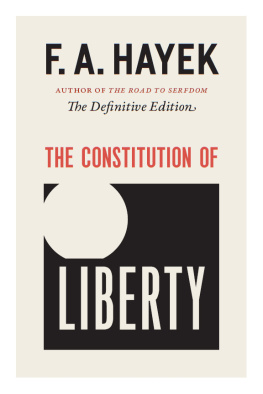
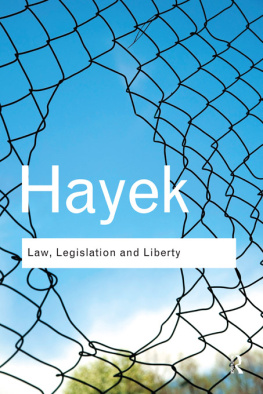
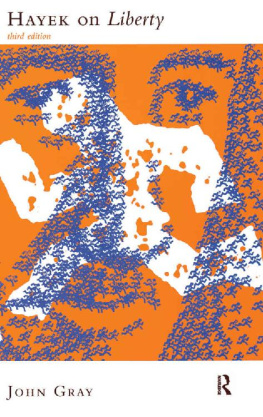
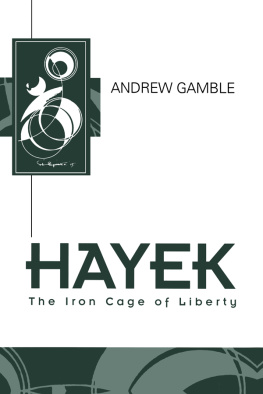
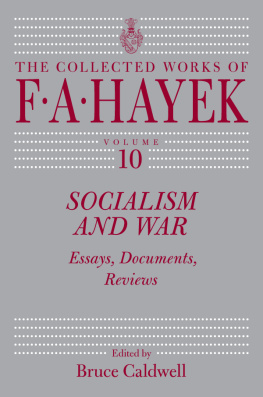
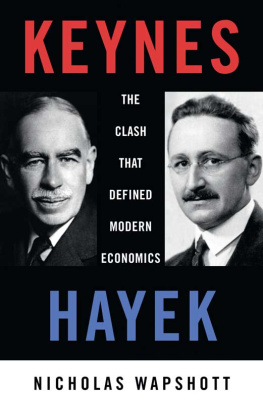
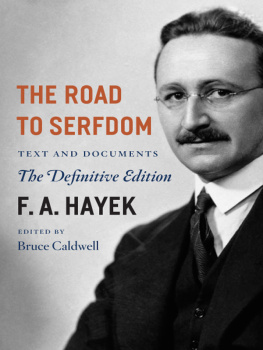
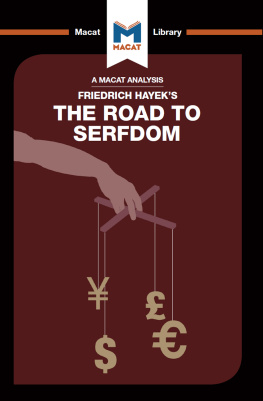
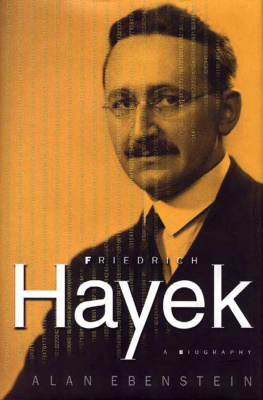
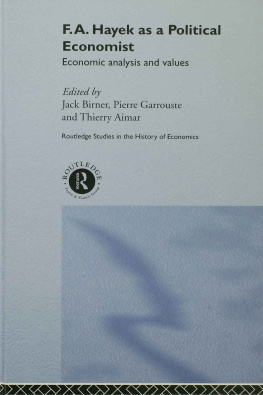
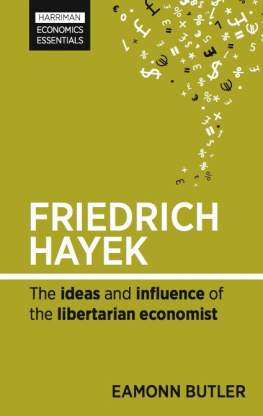
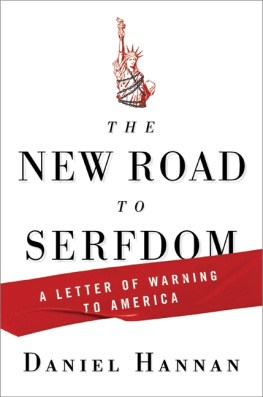
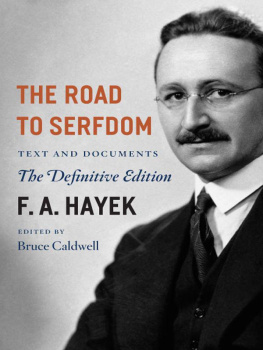

 The paper used in this publication meets the minimum requirements of the American National Standard for Information Sciences Permanence of Paper for Printed Library Materials, ansi z39.48- 1992.
The paper used in this publication meets the minimum requirements of the American National Standard for Information Sciences Permanence of Paper for Printed Library Materials, ansi z39.48- 1992.